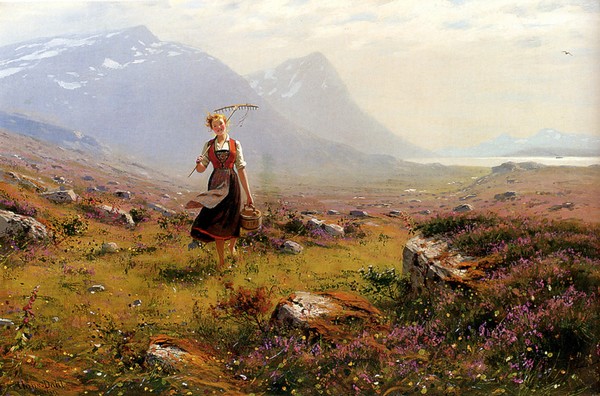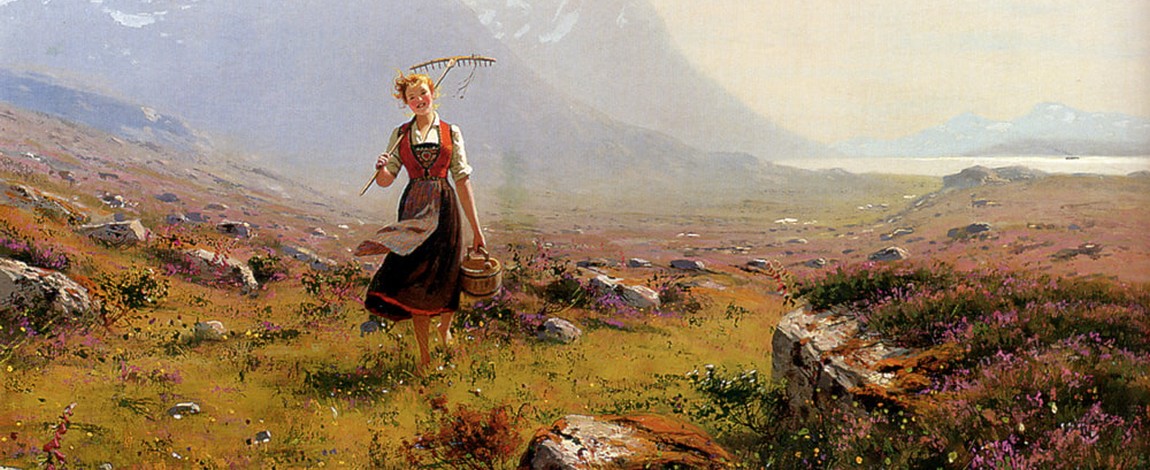
I told you last week that this week we would start the new season. But the truth is that, strictly speaking and to follow the tradition, it should start next week, the first Wednesday of September. It's not that important, but the thing is that I'm writing these lines in the middle of Schubertíada, with the head full of music and no time to focus on a long article. I hope you won't mind if, one more week, I post a short article.
I suggest we hear a beautiful Lied that has been with me for some weeks. One day, I heard only a few phrases, in passing, and I was unable to identify it. I was certain, however, that I had recently listened to it, and I finally remembered: the song was Die Sennin [The herdswoman] by Schumann, the No. 4 of his Op. 90, which Catriona Morison and Julius Drake had performed in Barcelona last May.
The poem speaks of a herdswoman who sings in the valley, and with her singing moves even the rocks, she penetrates its soul and makes them sing. This image made me think of another herdswoman that sings. Maybe you've seen Lunana, a Yak in the classroom, which was an Oscar nominee for best international feature. The film is set in a remote village of Bhutan, so remote that the main character moves there from the capital, Thimphu, and the last part of his journey consists of six days walking through the Himalayas.
One of the film's characters is Saldon, a yak-herdswoman, who sings while watching the yaks. The main character asks her why does she sing, if she doesn't have any audience (he, who aspires to be a successful singer). She explains it's an offering to everything around her: her neighbours, the animals, and the spirits in the valley. She sings as birds do, without worrying about whether someone listens to them. Does the shepherd of our song, in a valley, let us say, in the Alps, also sing to offer her voice and her song to everyone and everything around her?
Saldon's song in the Himalayas has a natural elegance, as surely does our shepherd's. We listen to it through Schumann's music, which has a bit of sophistication that makes the song really attractive; some phrases can remain in our heads for days. This happens only during the first two stanzas because a poem by melancholic and pessimistic Nikolaus Lenau cannot be happy; at the last two stanzas, the poetic voice thinks of the day that the herdswoman will leave the valley because she will fall in love or because she will die, and the mountains will remain alone without her song. The music then changes; the piano continues to remember the singing of the woman, but the vocal line, still beautiful, becomes sad and ambiguous.
After taking you to the movies, I'm taking you again to Vilabertran, where this story ends. Die Sennin wasn't programmed at any recital, but after a cancellation and the corresponding programme change, we listened to it sung by Matthias Goerne, accompanied by Alexander Schmalcz. So, I leave you with this beautiful song sung by Goerne as well; this time, with Eric Schneider at the piano.
Schöne Sennin, noch einmal
Singe deinen Ruf in’s Thal,
Daß die frohe Felsensprache
Deinem hellen Ruf erwache.
Horch, o Sennin, wie dein Sang
In die Brust den Bergen drang,
Wie dein Wort die Felsenseelen
Freudig fort und fort erzählen!
Aber einst, wie Alles flieht,
Scheidest du mit deinem Lied,
Wenn dich Liebe fortbewogen,
Oder dich der Tod entzogen.
Und verlassen werden stehn,
Traurig stumm herübersehn
Dort die grauen Felsenzinnen
Und auf deine Lieder sinnen.
Sing your song into the valley.
So that the happy utterance of the rocks
Awakens to your bright song!
Listen, oh herdswoman, how your singing
Has penetrated into the breast of the mountains,
How the souls of the rocks repeat
Your words over and over!
But sometime, as everything passes,
You and your song shall depart,
When love has lured you away,
Or death has taken you.
And, forsaken will stand,
Looking at us sadly mute,
The grey rocky crags,
And will ponder your songs.
(translation by Sharon Krebs)




 This we...
This we...










